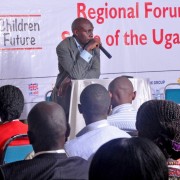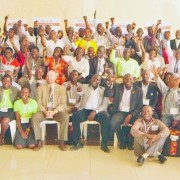U.S. Ambassador Deborah R. Malac on March 30 launched the distribution of more than 1.5 million pupil books and teacher guides in twelve local languages and English to more than 5,000 schools in Uganda. The U.S, Mission, through the U.S. Agency for International Development (USAID), also presented the Government of Uganda 54 titles approved by the National Curriculum Development Centre (NCDC) as part of the new national school curriculum. The titles include teacher guides and pupil reading texts for primary 1- 4, in English and in 12 local languages.

On February 2, 2016, the United States Government, in partnership with the Government of Uganda and Mbarara district local government, hosted more than 250 participants at the fourth Regional Forum on the State of the Ugandan Child. The forum put a special focus on the challenges faced by children in southwestern Uganda. Previous regional forums were held in Gulu, Mbale, and Arua.

On December 16, 2015, the United States Government in partnership with the Government of Uganda and Gulu district leadership hosted over 300 participants at the first Regional Forum on the State of the Ugandan Child with special focus on challenges faced by children in northern Uganda.
A new E-verification system that will help Ugandan farmers gain more profits by ensuring that the seeds and fertilizer they use are real was launched today at the Serena Hotel in Kampala. With the new E-Tag system, developed by the Uganda National Bureau of Standards (UNBS) to support trade, farmers will scratch a silver panel located on the product to reveal a code and then send that code to the number provided on the scratch panel using their mobile phone to verify the authenticity of the product. Because the mobile call is free, agro dealers selling genuine products are happy to verify the products for their customers.
Uganda is in the midst of a demographic tsunami with its population doubling every 16 years. Uganda’s systems must be transformed to rapidly increase agricultural productivity, curb accelerating environmental degradation, alleviate the burden of communicable diseases, and educate and train a more and increasingly younger population of Ugandans that need to be both more productive and more involved as citizens. The rapidly growing population exacerbates high levels of youth unemployment and amplifies pressures on social, natural and other resources. Inadequately addressed, these issues will lead to a growing number of marginalized Ugandans without access to public or other services; lacking resilience to shocks and stresses; and held back from their progress; and, thus, unable to realize their individual or collective potential.








Comment
Make a general inquiry or suggest an improvement.